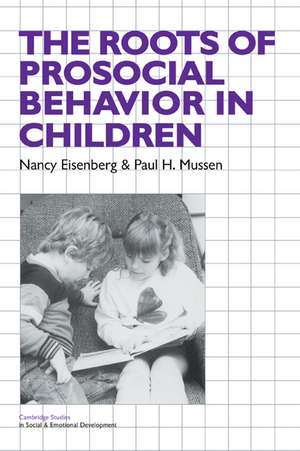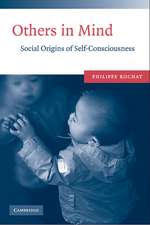The Roots of Prosocial Behavior in Children: Cambridge Studies in Social and Emotional Development
Autor Nancy Eisenberg, Paul Henry Mussenen Limba Engleză Paperback – 24 aug 1989
Din seria Cambridge Studies in Social and Emotional Development
-
 Preț: 381.54 lei
Preț: 381.54 lei -
 Preț: 325.29 lei
Preț: 325.29 lei -
 Preț: 361.75 lei
Preț: 361.75 lei -
 Preț: 310.63 lei
Preț: 310.63 lei -
 Preț: 307.06 lei
Preț: 307.06 lei -
 Preț: 305.12 lei
Preț: 305.12 lei -
 Preț: 297.84 lei
Preț: 297.84 lei -
 Preț: 357.51 lei
Preț: 357.51 lei -
 Preț: 437.00 lei
Preț: 437.00 lei -
 Preț: 284.01 lei
Preț: 284.01 lei -
 Preț: 322.12 lei
Preț: 322.12 lei -
 Preț: 380.22 lei
Preț: 380.22 lei - 14%
 Preț: 788.11 lei
Preț: 788.11 lei -
 Preț: 358.28 lei
Preț: 358.28 lei -
 Preț: 320.17 lei
Preț: 320.17 lei -
 Preț: 350.09 lei
Preț: 350.09 lei -
 Preț: 323.81 lei
Preț: 323.81 lei - 14%
 Preț: 896.20 lei
Preț: 896.20 lei - 11%
 Preț: 608.49 lei
Preț: 608.49 lei -
 Preț: 319.61 lei
Preț: 319.61 lei -
 Preț: 322.51 lei
Preț: 322.51 lei -
 Preț: 326.31 lei
Preț: 326.31 lei -
 Preț: 289.39 lei
Preț: 289.39 lei -
 Preț: 315.38 lei
Preț: 315.38 lei -
 Preț: 288.76 lei
Preț: 288.76 lei -
 Preț: 324.62 lei
Preț: 324.62 lei
Preț: 280.15 lei
Nou
Puncte Express: 420
Preț estimativ în valută:
53.61€ • 55.65$ • 44.70£
53.61€ • 55.65$ • 44.70£
Carte tipărită la comandă
Livrare economică 25 martie-08 aprilie
Preluare comenzi: 021 569.72.76
Specificații
ISBN-13: 9780521337717
ISBN-10: 0521337712
Pagini: 208
Dimensiuni: 153 x 232 x 17 mm
Greutate: 0.27 kg
Ediția:New.
Editura: Cambridge University Press
Colecția Cambridge University Press
Seria Cambridge Studies in Social and Emotional Development
Locul publicării:New York, United States
ISBN-10: 0521337712
Pagini: 208
Dimensiuni: 153 x 232 x 17 mm
Greutate: 0.27 kg
Ediția:New.
Editura: Cambridge University Press
Colecția Cambridge University Press
Seria Cambridge Studies in Social and Emotional Development
Locul publicării:New York, United States
Cuprins
Preface; 1. Introduction; 2. Methodological and theoretical considerations in the study of prosocial behavior; 3. Biology and prosocial behavior; 4. Culture and prosocial behavior; 5. 'Person' variables and prosocial behavior; 6. Socialization in the family; 7. Socialization by agents outside the family; 8. Cognition, role taking, interpersonal prolem solving, and moral judgment; 9. Emotional factors in prosocial behavior; 10. Situational determinants; 11. Conclusions; References; Name index; Subject index.














